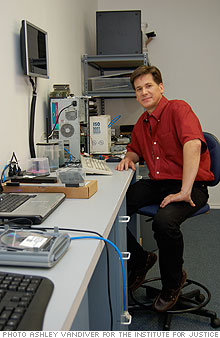Should the Geek Squad need private-investigator licenses?
A Texas law, now being challenged in court, says computer technicians could need PI licenses.
(Fortune Small Business) -- In order to keep his business AustinPCTech legal, Mike Rife may have to become a real-life Sherlock Holmes. He fears that a new Texas law will require his small PC repair company to obtain a private-eye license, or risk incurring a $4,000 penalty and jail time.
As for why ... that's a mystery Rife hopes to solve soon.
Rife is a client of the Institute for Justice (IOJ), which filed a lawsuit against the Texas Private Security Board in June challenging a new state law that, the IOJ says, would require computer repair companies to obtain private-investigator licenses. The IOJ is suing on behalf of Rife and several other computer-services firms.
The Texas Private Security Board filed a response Thursday with the Travis County District Court in Austin, claiming that the IOJ has no standing to bring the lawsuit. The board also offered the defense that it is "entitled to sovereign immunity."
Texas law regulates private investigators, a group overseen by the Private Security Board. A bill sponsored by Rep. Joe Driver (R-Garland) in the Texas legislature last year and passed into law expanded that definition to include companies that sleuth around in computer data.
Driver says he sponsored the legislation, which was part of a large omnibus bill, because the private security industry "needed cleaning up." The change wasn't meant to put computer-repair technicians out of business, he says.
"If you're investigating or analyzing data, then you should need a little more credentials than someone who just repairs computers," he said.
Now, the law reads that any company that engages in the business of obtaining "information through the review and analysis of, and the investigation into the content of, computer-based data" needs a private investigator's license. Driver describes the distinction between computer repair and computer investigation in this way: If a client asks a technician to retrieve a specific file from the computer, that's fine. If a client asks the technician to dig around in search of criminal activity or to track the behavior of employees, that would constitute an investigation.
But Matt Miller, executive director of the Institute for Justice's Texas chapter, says the wording of the law is so broad that it leaves room for multiple interpretations.
"If I bring my kid's computer into a shop to see what he's been looking at online, does that constitute an investigation?" Miller asks.
While the law, which went into effect last fall, has not yet been enforced against any computer-repair companies, the Private Security Board has issued warnings to technicians including a Best Buy (BBY, Fortune 500) Geek Squad service in Houston.
That warning stemmed from a customer complaint alleging that a Geek Squad employee told a customer that he could help "investigate computer crime."
The warning, sent Oct. 17, states: "The review of computer data for the purpose of investigating potential criminal or civil matters is a regulated activity."
Miller points out that "civil" could mean a plethora of things. If a computer technician generates a report, documenting Internet histories, that could constitute a "civil" investigation.
"There's clearly a live legal dispute here, because they've given us specific examples of what they say are regulated services," Miller said. "Based on their public statements, our clients are concerned, and we're seeking a declaration of our rights from the court."
The IOJ maintains that Rife, whose computer-repair business has just three employees, cannot take time off to complete the criminal-justice degree or three-year apprenticeship necessary to obtain a private investigator's license. If Rife is required to obtain such a license, he might have to close his business for good, according to the IOJ's court filings.
The Private Security Board's aggressive response this week to the IOJ's lawsuit means that the debate, and the court case, will proceed - leaving Rife and his fellow technicians waiting a bit longer to hear "case closed, my dear Watson." ![]()
Slaying the Boogie Monster: An Arizona saloon owner takes down antiquated dance ban.
Geek Squad's second act
-
The Cheesecake Factory created smaller portions to survive the downturn. Play
-
A breeder of award-winning marijuana seeds is following the money and heading to the U.S. More
-
Most small businesses die within five years, but Amish businesses have a survival rate north of 90%. More
-
The 10 most popular franchise brands over the past decade -- and their failure rates. More
-
These firms are the last left in America making iconic products now in their twilight. More











